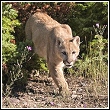Panthers In Florida
The Florida panther is an endangered subspecies of the cougar found in Florida, with the heaviest populations in the southwestern part of the state (in the western half of the state, south of the Caloosahatchee River).
Panthers are more than just beautiful animals, they a beneficial part of the eco-system in which they reside. Panthers help control wild pig, raccoon, armadillo and deer populations. However, they can present a danger to residents when they venture into neighborhoods, suburbs and even urban areas - killing wildlife and pets, and possibly attacking humans.
As an endangered species, there are much needed measures in place to help protect the Florida panther from extinction, but these measures also restrict what can be done once a panther risk occurs. If you suspect you have a cougar problem, please contact us, we can help determine if a panther is in the area, and we can help with preventative measures that can be beneficial without breaking any laws or presenting a risk to the panther.
Populations, Habitat & Range
An endangered subspecies (Puma concolor coryi) of the cougar (Puma concolor), there are estimated to be only 100 - 200 Florida panthers remaining in the wild. The Florida Panther National Wildlife Refuge was established in the late 1980's by the US Fish and Wildlife Service to help support the survival of the species.
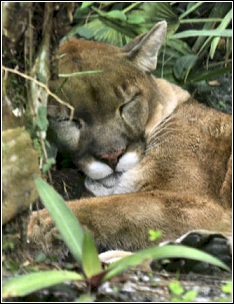
The panther is referred to by many names across the country, depending on the region. In the Colorado and California, it is commonly called a mountain lion, at other times or in other places it may be referred to as a cougar, panther, or puma. In Florida it is primarily referred to as a panther.
Officially the Florida panther is the only cougar species found east of the Mississippi river, and its range is primarily located in Southwest Florida.
Panthers do well in a variety of Florida habitats including forests, prairies, swamps and stands of saw palmetto.
Typical threats to the Florida panther and its population in the state include alligators, humans (hunting, poaching, vehicular collisions and loss of habitat), in breeding, disease, and other panthers. Mercury levels have also been suspect in the deaths of some panthers, primarily those that feed heavily on fish and smaller game such as raccoons in areas where mercury levels are high in that particular habitat.
There are various ongoing efforts to help the Florida panther today, i.e., education and awareness programs, scientific studies, steps toward genetic diversity and the establishment of protected habitats.
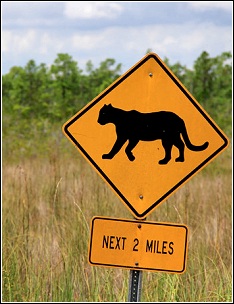
The Florida Fish and Wildlife Conservation Commission has some great handouts including A Guide To Living With Florida Panthers and the E-Z guide to help residents identify panther tracks. You can also elect to buy a Protect The Panther license plate which helps support the research and management of Florida panthers.
Livestock Attacked By Cougars
Cougars wandering into residential and agricultural areas have been known to prey upon pets and livestock. The Wildlife Whisperer has investigated and helped resolve cougar issues on several different occasions.
The first photo is representative of the many goats, sheep and livestock killed by cougars each year. The second photograph to the right is picture of a cow that had been attacked by a cougar as well. Note the claw marks on the cow where the cougar planted its teeth into the anus area, and then attempted to dig into the hide with its claws in order to take it down.
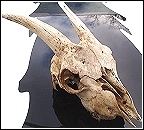
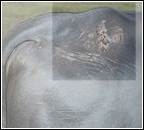
This cow's photo was taken at least two weeks after the said attack. The cow was protecting a calf, and obviously got in the way. It took a considerable amount of time to take this picture, as she was still quite "spooked". Ned Bruha, attempted to remedy the problem with this particular panther after it had depleted all the poultry in the area, and had jumped over the top of horse stalls in an attempt to have a foal for dinner. Bruha became the hunted when the lion marked his truck on top of the morning dew, and also placed tracks all around the vehicle... getting within 25 yards of Bruha. Panthers are smart animals.
Bruha encountered the same lion a week later 2½ miles south of the original spot - once again harassing a rancher's cattle.
Feral Dog Attacks
Feral dog attacks are sometimes misidentified as panther attacks, but a feral dog pack will not typically be able to defend fresh kills or drag them out of harm's way, so there are ways to tell the difference.
If you lose cattle, sheep or pets to an attack, please shave the dead animal's fur off and take pictures. This may be difficult if you were attached to the animal, but this work will greatly assist us in identifying the animal that attacked yours, and proper identification may help prevent further attacks. Without your animals fur removed, claw and bite marks will not be easily distinguished and we will have less chance of making an accurate determination as to the cause. A veterinarian or sheep shearing business may be able to help with this if you do not wish to do it yourself.
Panther safety in Florida starts with knowledge, consequently, we've prepared further information for you on cougars and panther control, prevention and safety, and what to do if attacked.
1242 SW Pine Island Rd., Suite 310
Cape Coral, Florida 33991-2126
help@totalwildlifecontrol.com



